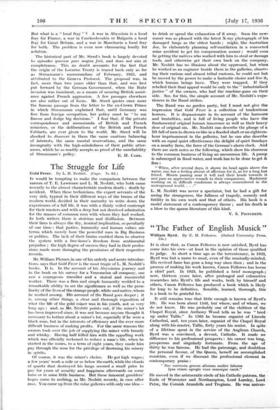The Struggle for Life Gold Fever. By L. M. Nesbitt.
(Cape. 7s. 6d.) IT would be tempting to make the comparison between the careers of T. E. Lawrence and L. M. Nesbitt, who both came recently to the almost characteristic modern death : death by accident. When these technicians, the expert servants of the very rich, typical in their different ways of the brains of the modern world, decided in their maturity to write down the experiences of a full life, it was with a thinly veiled contempt for their masters and with a deep but not deceived admiration for the masses of common men with whom they had worked. In both writers there is stoicism and disillusion. Between their lines is always the dry, ironical implication, so peculiarly of our time : that justice, humanity and human values are terms which merely bore 'the powerful man in Big Business or politics. The luck of their brains enabled them to observe the system with a free-lance's freedom from sentimental prejudice ; the high degree of success they had in their profes- sions made more damaging the pessimism of their respective records.
Mr. William Plomer, in one of his orderly and acute introduc- tions, says that Gold Fever is the most tragic of L. M. Nesbitt's Woks. It is. In the account of his Abyssinian journey and in the book on his survey for a Venezuelan oil company, one saw a courageous traveller and a stoical and resourceful worker. There was a firm and simple humanity wedded to a remarkable ability to see the significance as well as the pecu- liarity of the lives of the strange people, white and native, whom he worked among. His account of the Rand goes deeper ; it is, among other things, a clear and thorough exposition of what the life of the gold miner was in his youth, not so very long ago ; and, as Mr. Nesbitt points out, if the miner's lot has been improved since, it was not because anyone thought it necessary to bother about a miner's lot, especially if he were a black man, but in the interests of efficiency and the ever more difficult business of making profits. For the same reasons the owners took over the job of' supplying the miner with brandy and whisky. Having half killed him with the appalling work which was officially reckoned to reduce a man's life, when he started in the mines, to a term of eight years, they made him pay through the nose for the privilege of drowning his misery in spirits.
Of course, it was the miner's choice. He got high wages ; a few years' work a mile or so below the earth, while the clouds of quartz dust destroyed his lungs seemed a small price to pay for years of security and happiness afterwards on some farm or in some little business. But these innocent gamblers' hopes came to nothing, as Mr. Nesbitt records, in case after case. You same up from the Mine galleries with only one idea— to drink or spend the exhaustion of it away. Soon the new- comer was as pleased with the latest X-ray photograph of his
damaged lungs as the oldest hands ; might, like Australian Joe, be elaborately planning self-mutilation in a concocted mine accident to get his compensation sooner ; would soon be getting the natives who worked with him to steal or damage tools, and otherwise get their own back on the company.
Mr. Nesbitt has no illusions about the oppressed, but when he worked as an engineer beside them in the galleries, observ- ing their curious and almost- tribal customs, he could not but be moved by the power to make a fantastic choice and live it, which human beings have. They were trapped. If they rebelled their final appeal would be only to the " industrialised justice " of the owners, who had the machine-guns on their side. See, for this, the simple account of Mr. Nesbitt's expe- riences in the Rand strikes.
The Rand was no garden party, but I must not give the impression that Gold Fever is a collection of tendentious horrors. It is dispassionate in its account of the humours and brutalities, and is full of living people who have the fundamental original human innocence as well as their heavy
dose of original sin. Mr. Nesbitt can describe the plunge of a lift full of men to drown en bloc in a flooded shaft or an eighteen- hour imprisonment in the galleries, but he can also describe
with an equal quiet effectiveness the delight of quiet Sundays on a nearby farm, the farce of the German's alarm clock. And there are such notes as the following, which show his closeness to the common business of living an uncommon life. A pump
is submerged in flood water, and work has to be done to get it free : " When, after several days, it shows its head again above the water, one has a feeling almost of affection for it, as for a long lost friend. Miners passing near it will nod their heads towards it and pass an appreciative remark to their companions. Machinery working on in difficult conditions is always remembered in the underground world. . . ."
L. M. Nesbitt was never a spectator, but he had a gift for seeing the strangeness, the fullness of tragedy, comedy and futility in his own work and that of others. His book is a model statement of a contemporary theme ; and his death is a blow to the sparse literature of this kind.
V. S. PRITCHETT.














































 Previous page
Previous page